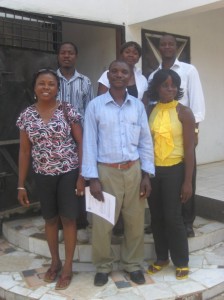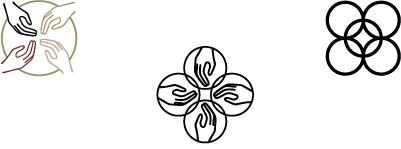
Project and Host
What is the Liberia Peacebuilder Initiative?
Global Citizen Journey (GCJ) is partnering with Population Caring Organization (PCO) and other local organizations in Liberia to launch the Liberia Peacebuilder Initiative (LPI). We convened a series of trainings where for Peacebuilders to engage in learning, network, sharing of stories and envisioning a future that works for all Liberians. In our ‘pre-trip’ visit in January, 2010, we began building a network of support. With the help of a number of NGOs we will select key participants who have had previous training and experience in facilitation, conflict resolution and mediation so they can more readily integrate what we offer. We seek participants who are involved with existing networks to leverage the learning and spread the experience more widely. Plus the participants need to have deep roots in their local community, to build this network from the grassroots. This approach develops what leading Peacebuilder John Paul Lederach refers to as a “middle-range approach to peacebuilding” — working with a set of leaders who can provide the key to creating an infrastructure for sustaining peace.
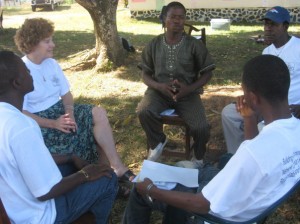 We will carefully constitute these teams to insure they reflect the diversity of Liberia: 16 ethnic groups, men and women, range of ages, religious affiliations, location, rural and urban, former combatants, and former refugees. We will incorporate traditional practices to promote healing and reconciliation. There will be Post Summit follow-up and support so trained Peacebuilder Teams can bring what they have learned to their communities.
We will carefully constitute these teams to insure they reflect the diversity of Liberia: 16 ethnic groups, men and women, range of ages, religious affiliations, location, rural and urban, former combatants, and former refugees. We will incorporate traditional practices to promote healing and reconciliation. There will be Post Summit follow-up and support so trained Peacebuilder Teams can bring what they have learned to their communities.
Why launch the Liberian Peacebuilder Initiative?
Years of brutal civil conflict have left Liberia with a traumatized population and a devastated infrastructure. 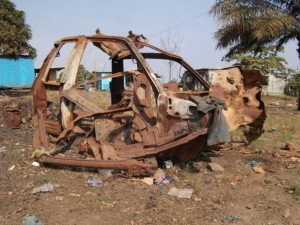 Although peace has been secured at a governmental level, conflicts and tensions at the community level and the trauma and wounds from the years of violence still threaten to disrupt the fragile post-conflict situation. There is a tremendous need for community based leaders to build inter-ethnic trust, to learn the skills of non-violent conflict resolution, reconciliation and collaborative networking – the foundations for democracy, development and a sustainable peace. Experts acknowledge that peace must be built at the grassroots level as well as at the higher, official levels of treaties and agreements; the tendency to leap ahead with economic development without a concomitant focus on individuals and local conditions often results in a reversion to violence. It is fair to say that there are few Liberians whose lives were unaffected by the civil conflict: therefore any conflict resolution training must include processes that allow for the clearing of pain and emotionality created by the trauma. (read more)
Although peace has been secured at a governmental level, conflicts and tensions at the community level and the trauma and wounds from the years of violence still threaten to disrupt the fragile post-conflict situation. There is a tremendous need for community based leaders to build inter-ethnic trust, to learn the skills of non-violent conflict resolution, reconciliation and collaborative networking – the foundations for democracy, development and a sustainable peace. Experts acknowledge that peace must be built at the grassroots level as well as at the higher, official levels of treaties and agreements; the tendency to leap ahead with economic development without a concomitant focus on individuals and local conditions often results in a reversion to violence. It is fair to say that there are few Liberians whose lives were unaffected by the civil conflict: therefore any conflict resolution training must include processes that allow for the clearing of pain and emotionality created by the trauma. (read more)
What will happen at the Summits?
Day 1 and 2: Workshops and training in Compassionate Listening* and conflict resolution*, sharing and building on traditional practices, hearing each other’s stories*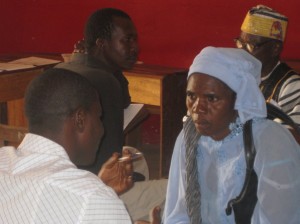
Day 3: Training in Restorative Circles* that are intended to repair the relationships damaged by conflict and allow for reconciliation
Day 4: Town Meeting sessions using large group dialogue processes (World Café* and Open Space Technology*) for sharing perspectives around such questions as: “How do we honor our traditions while reaching beyond them for a Liberia that works for all?”; “What do we need to reach true reconciliation and healing?” “What are the challenges and opportunities to create the future we want for our children?” “What are simple actions for economic development and self-sufficiency (e.g. growing gardens and selling produce, or a simple business like selling baked goods)?”
Day 5: Action plans and commitments for working in home communities. Closing ceremonies and rituals*
Cultural and Evening Activities*: Traditional cultural sharing at the opening, closing ceremony and nightly with music, storytelling, dancing, and other activities that have traditionally brought people together.
Post-Summit Activities: Each Peacebuilder Team (traditional, youth and woman leader from the various ethnic groups) will implement an action plan for creating small community meetings* and Town Meetings in their home community.
Small Community Meetings:
- Report on the Summit
- Offer training, practices and exercises in Compassionate Listening and conflict resolution.
- Show the videotaped stories from the Restorative Justice Circle in those communities having access to electricity.
- Facilitate discussions, and gather and record comments, inputs and suggestions from all participants. (Note: these comments will be in reports and shared at the next Summit, once it is funded.)
- Establish agreements for continuing to meet within the local community.
Town Hall Meetings: The Peacebuilder Team will be encouraged to convene a Town Hall in their community to discuss local concerns
(click here for details on *starred items of what happens at the Summits)
Host: Population Caring Organization
The Liberian Peacebuilder Initiative is being launched by GCJ in partnership with Population Caring Organization, founded by Emmanuel Dolo, at the Budumbura Refugee Camp for Liberians in Ghana, just outside of Accra. From 2003 to 2008, PCO established community Peace Cells (dialogue circle gatherings) in the refugee camp reaching hundreds of community members and helping to resolve the many cases of conflict that arise in an overcrowded and traumatized population. These discussion groups focused on domestic violence; community conflict; national and ethnic violence; misunderstandings and hatred; and how to build capacity for reconciliation – including strategies for ex-combatants and child soldiers. In December 2005, PCO brought together elders and traditional leaders from the 16 ethnic groups in a reconciliation ceremony that marked 15 months of intense peace-building dialogue in the Liberian Tribal Leaders’ Reconciliation Forum (LTLRF). They are eager to integrate these practices and many of their re-patriated colleagues and elders back in Liberia. Emmanuel believes it is essential for outsiders to come and work with him and others to build true peace –at the grassroots level, i.e. from the bottom up rather than governmental declarations. The peace is fragile because Liberia does not have its own security force – and thus depends upon the UN. It is difficult to develop its own security force when there is so little trust among the various ethnic groups.
Read the latest update from PCO – December 2009 through May 2010 report.

